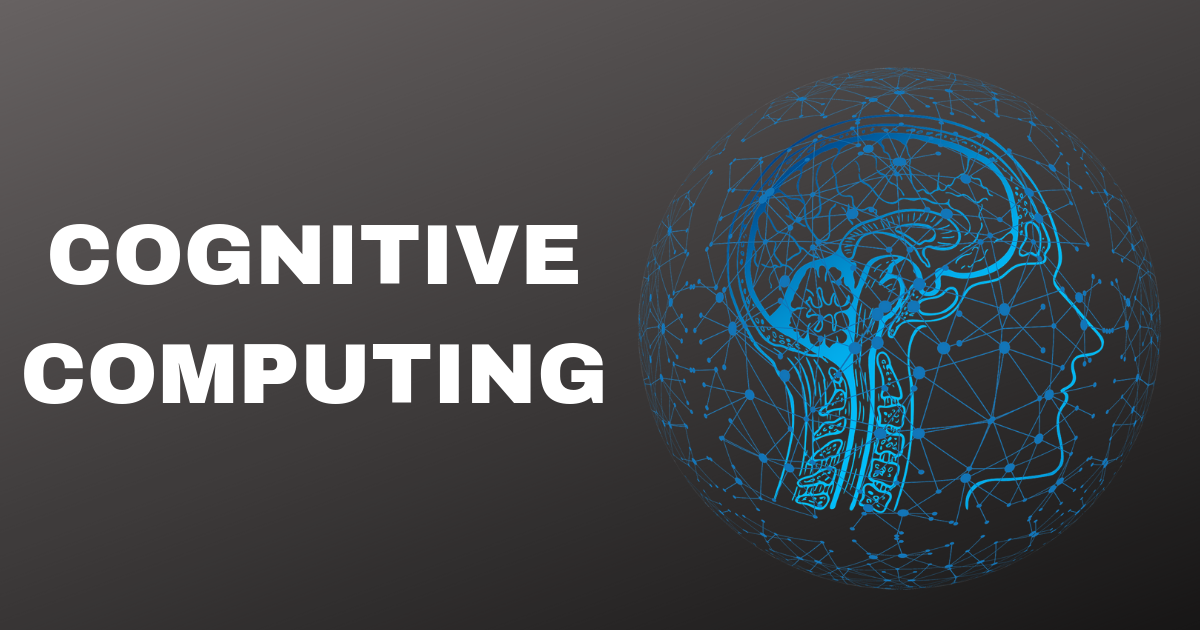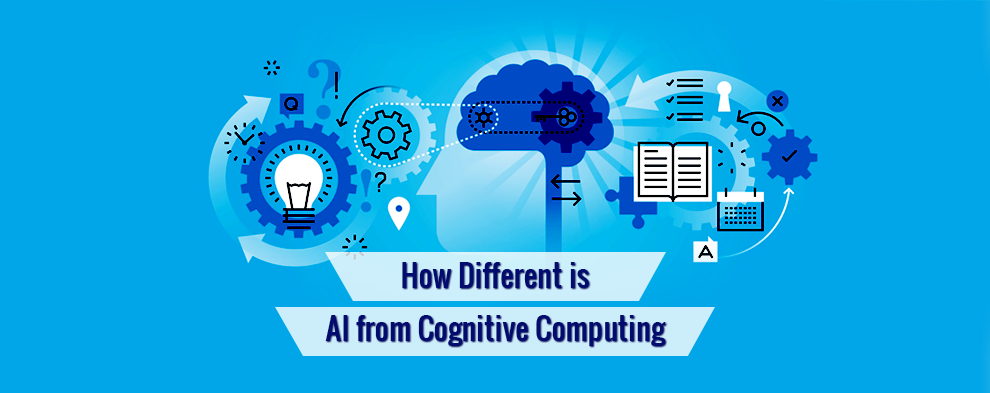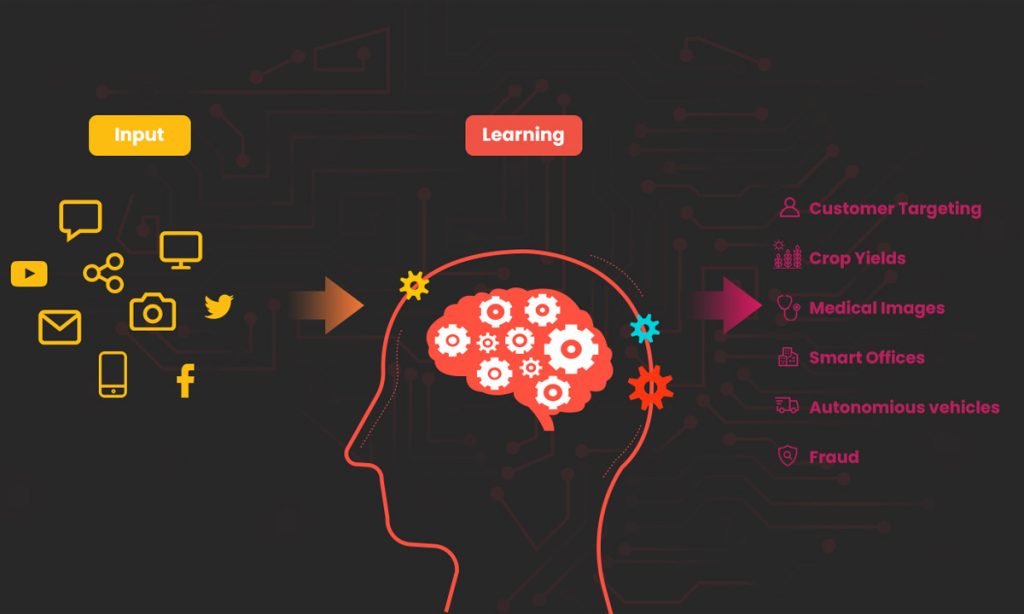Toggle navigation

So, what is cognitive computing?
We all know the meaning of the word ‘cognition’ which is related to the human mind and its intellectual approach. But does the human mind think the same for every possible question?
Suppose, I ask you what is 2+2?
For a mathematician, it means 4.
For a phycologist, it means a family; mother, father, and two children.
And, for a car manufacturer, it’ll mean that there are two front seats, and 2 rear seats.
So, the answer to the above question is no, the human mind doesn’t think alike for the same scenarios.
A good Samaritan once said that machines can never replicate what the human mind thinks. Machines can never be that smart. At some point, he wasn’t entirely wrong, but when we think in the context of cognitive computing, he wasn’t entirely correct.
Since the inception of computers, their motto is to serve humankind. There are advanced form of computers that work on rigid algorithms, and we can program a lot of things through them, but then, there are some computers that mimic the human brain, how they process thoughts, how they act, and their behavior.
This is what cognitive computing is all about.
As per its definition, cognitive computing is that branch of science that solves complex human thought problems and processes them in a computerized model. This is done using self-learning algorithms like data mining, pattern recognition, natural language processing, helping to mimic the way the human brain works.
In simple words, cognitive computing involves the study of the human brain and how it functions. This division of computer science has far-reaching impacts of different business segments like healthcare, education, and much more.
Cognition is an amalgamation of context and reasoning. Coming over to cognitive systems, it mimics the human mind and how it processes. These systems analyze the information and draw inferences using probabilistic analysis.
Now, what is probabilistic analysis?
It is an approach to estimate the computation complexity of an algorithm. It begins from an assumption and the probabilistic distribution of the set of all possible inputs. They keep on learning from the data and reprogram themselves continuously. This can be understood from the example, the best chess player in the world is not a human, neither a computer. It is the amalgamation of the best of human and the best of computer systems.
In other words, you can think of cognitive systems, as the best of human and the best of the computer combined.
Thinking about whether there is any master cognitive computing system that we just talked about?
Well, IBM’s Watson is one such system that involves deep learning algorithms, and neural networks, to process the information and then compare them in a set of data. Furthermore, the more a cognitive system like Watson is exposed to data, the more it learns, and the more accurate it becomes over time.
For any cognitive system to work, it must possess the following key attributes.

Throughout computing expeditions, from self-driving cars to personal assistants, machines have already learned to write, speak, see, hear, learn, and reflect. But in cognitive computing, the big question is, can machines understand? For a machine to be an exceptional agent, it’s not enough to know the words you talk about and give you responses in return, but they should be able to understand what you want, and then provide you with assistance in that context.
Many-a-times, cognitive computing, and AI are said to be similar. They might hold some similar characteristics, but the two computer sciences are very different in many ways.
The following table talks about cognitive computing vs AI, and which one of them is better for which industrial segment. Frankly, cognitive computing is the best possible aid for healthcare providers and nobody can vouch for them to be replaced by AI agents.
|
COGNITIVE COMPUTING |
ARTIFICIAL INTELLIGENCE |
|
Cognitive computing is all about systems solving problems with humanlike thinking. |
Artificial intelligence is all about making machine do intelligent things. |
|
It mimics the human thought process. |
It does not try to mimic human thought processes at all. |
|
It is a subset of AI that does not only include the ideals of AI but also machine learning, reasoning, and natural language processing. |
AI is making computers learn how to perform human tasks, getting them to a place where human intervention will not be required at all. |
|
It stimulates human thought process to assist users in making smarter and humanlike decisions. |
It uses all the available data to deliver solutions to the complex problems. |
|
It can be used in industrial segments like healthcare and customer service. |
It can be used in industrial segments like finance, healthcare, retail, security, manufacturing and government services. |
|
Suppose, there is a scenario is which a list of patient data is to be processed to find the most suitable treatment for a patient. As for cognitive computing, they will come up with the information that will help the doctor in providing a treatment. In this scenario, the doctor will have the final decision. |
Suppose, there is a scenario is which a list of patient data is to be processed to find the most suitable treatment for a patient. The AI-assistants will assess the patient’s symptoms and them find the most relevant treatment option from its previous analysis. |
|
Cognitive computing will supplement its own decision rather than deciding for the doctor. |
This will remove doctors out of the frame since the AI agents will be taking all the decisions regarding the treatment of patients. |
|
Cognitive computing assists humans to make smarter decisions giving the latter the final say. |
AI is constructed on the idea that machines can make better decisions on human’s behalf. |
|
Cognitive computing facilitates human intelligence to perform specific tasks. |
AI empowers a machine over humans to be smarter and better decision maker. |
|
Cognitive agents are said to analyse situations in diverse scenarios to come up to a decision. |
AI agents are fed with data for a very long time to learn the variables for perfect solution. |
Now that we know how cognitive computing and AI are different from each other, let’s talk about the different cognitive computing industries functioning in the world.
Google’s voice technology is an example of cognitive computing. It recognizes human voice 98% accurate. DeepFace from Facebook recognizes faces with 97% accuracy. Presently, the arcade of cognitive computing is pioneered by IBM, Microsoft, and Google. Furthermore, these companies are investing highly in R&D related to cognitive computing.
Companies like SparkCognition, Expert System, Microsoft Cognitive Services, IBM Watson, Numenta, DeepMind, Cisco Cognitive Threat Analytics, CognitiveScale, CustomerMatrix Cognitive Engine, and HPE Haven OnDemand are some industries working towards developing cognitive computing platforms.
Cognitive computing is said to be the third era of computers, bringing humanlike thinking processes into machines. If Gartner has to be believed, it said that cognitive computing is going to disrupt the digital sphere, unlike any other technology, in the last 20 years.
Cognitive computing has made it easy for machines to align with real-life scenarios. Therefore, it acquires a host of benefits for companies that employ in its R&D. These include:
Unlike any other computing systems, cognitive systems are highly efficient in collecting, realigning, and cross-referencing of the data. For example, IBM Watson has helped physicians to collect and analyze medical data from various sources like the previous medical records, medical journals, diagnostic tools, and previous related medical data. This helps in providing a data backed up treatment that is fruitful for both the doctor and the patient. So, instead of replacing doctors as AI predicted, it employs a Robotic Process Automation to speed up the analysis and work in coordination with the doctors.
It can study a vast amount of data but simplify processes, reduce risks, and indulge in a more learned and efficient system. It prepares businesses for many emerging patterns, spot business opportunities, and takes care of critical tasks, all in real-time.
Since cognitive computing is all about providing relevant, contextual, and valuable customer information, it doesn’t need to interact with other staff members and still provide the needy details to the customers. This enhances the customer experience and indulges in satisfactory services while keeping them engaged with the business.
No technology is perfect. Cognitive computing might have the potential, to change the way machines and humans interact and comprehend. But it still suffers from certain challenges in its path towards greater adoption. These include,
With every technology, security is one of the issues associated with it. Since cognitive computing will handle a lot of data, many people are concerned with data security and encryption levels.
Cognitive computing will have to, therefore, resolve issues related to security breaches by developing an effective security plan to maintain data integrity.
The end question of any technology is its adoption rate. This is the long-term vision for any technology to proceed further. Once the data security segment of cognitive computing is managed, the adoption process will be streamlined as well. This is a collaborative approach, and it is how cognitive computing will further into other industrial dimensions.
Humans are resistant to change because they are comfortable with their nature and surroundings. Furthermore, since cognitive technology has the power to learn like humans, it turns the fear of machines replacing humans, true.
However, the objective of cognitive computing is to work in sync with humans and not replace it. Therefore, humans have to be nurtured for this technology. They will have to realize that this human-machine interaction is what will bring good to the world and humankind as well.
Development cycles that need a lot of time, money, space, and workforce make it harder for companies to adopt as a tech for the future. With time, the development cycles shorten and become versatile for adoption.
Cognitive computing can be implemented across multiple industry segments without lengthy development cycles that too in a limited amount of time.

So, what makes cognitive computing different from other forms of computing?
The answer is simple.
Cognitive computing is self-learning. This means that after cognitive systems receive initial instructions, they can very much learn other things on their own, depending on the data you feed to them.
It works on machine learning models. This means that it can learn from the data to decipher insights, without actually being programmed as to where they have to look.
It can perform human-like tasks. The system is educated to recognize human languages, understand objects, and perform highly specialized tasks.
It is intelligent. This means that it can, not only understand inputs like text, voice or video, but also reason and provide outputs.
The following are some fields in which cognitive computing is being applied.
It can be used for handling a large bunch of students, and since it remembers everything about a student, it can encourage better performance.
It can also be used in research dealing with a large amount of data.
This is one of the biggest uses of cognitive computing. It can analyze patient history, and current state by reviewing various parameters and devise conclusions such as diagnosis, treatment, etc. It can even prepare personalized diet and nutrition plans according to any patient.
It can help in market analysis and guiding investments. It can study a company’s history of shares concerning several factors like political, social, etc.
For a brand, customer experience is everything. To improve customer service, brands work on data, surveys, media comments, etc. Cognitive computing can help in fraud detection, speech and voice recognition, etc.
Cognitive computing is going to transform everything around us, the way we live, how we work, our thinking patterns, and much more. It is, therefore, a powerful tool that can automate manual processes using technology.
For organizations that want to reap maximum benefits out of it, they will have to analyze processes, data, talent model, and the market that it operates it. With so much to offer by cognitive computing, humans and machines can transition and make the future a bright and efficient one.
Leave a Reply